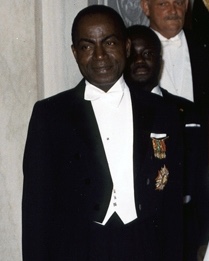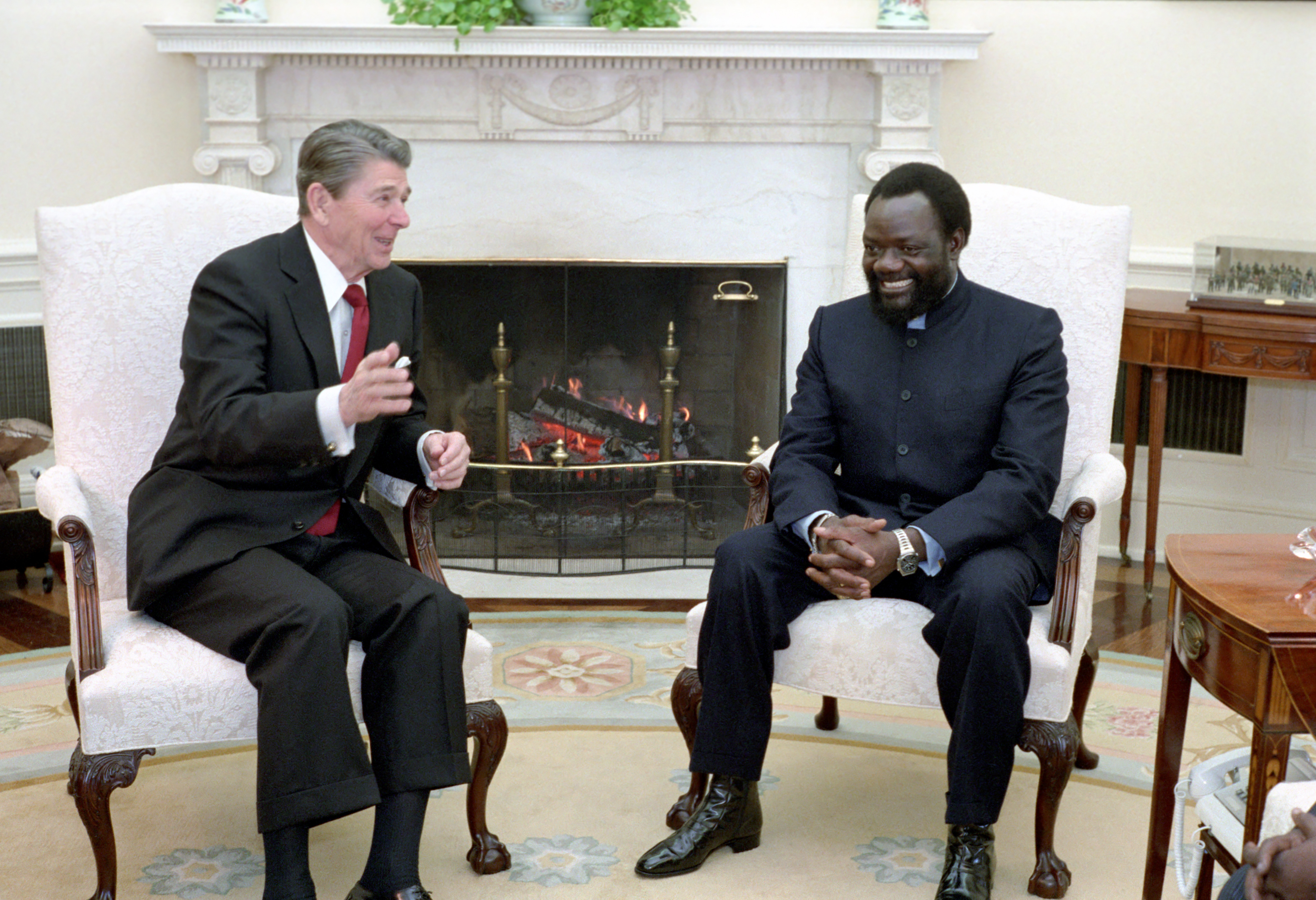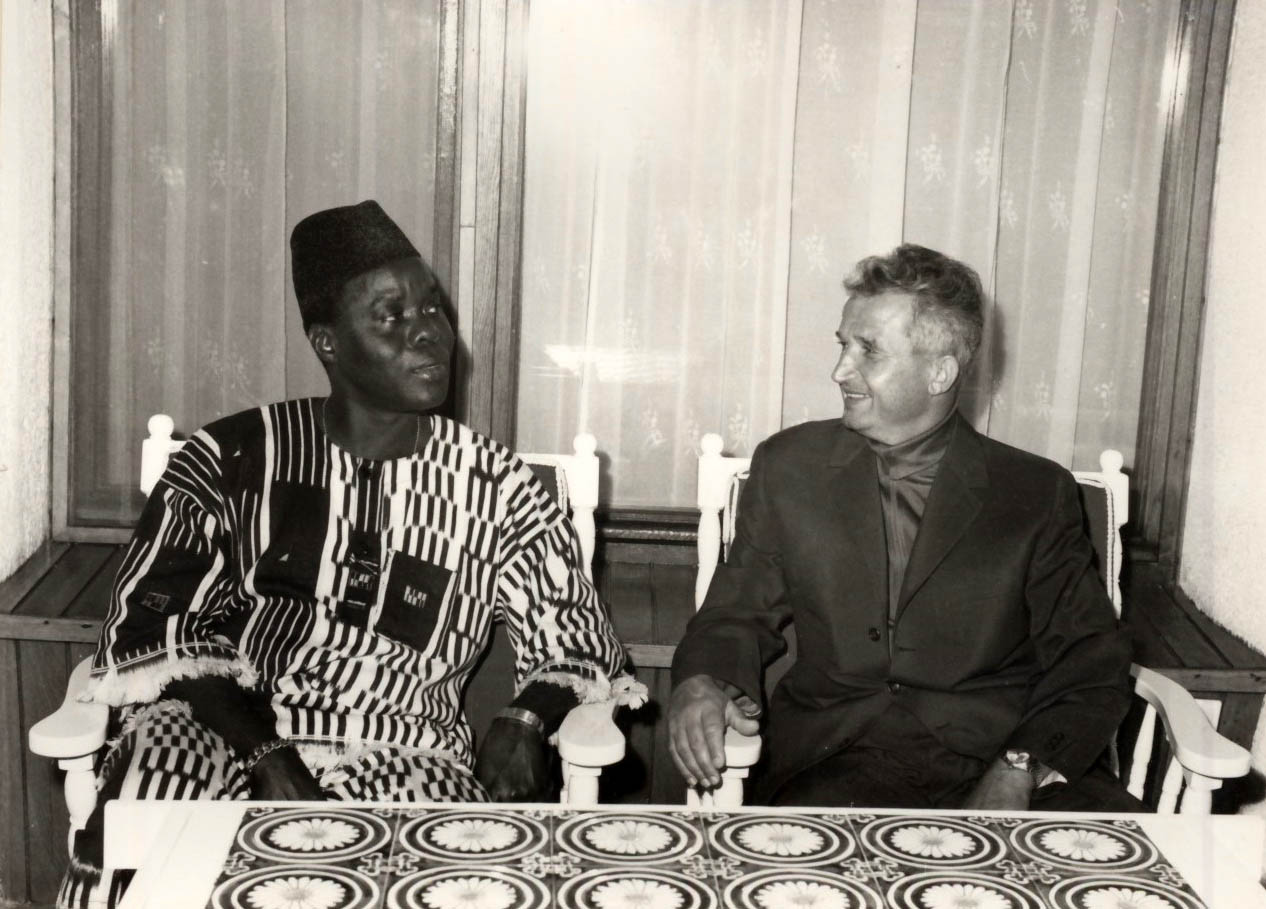|
Félix Houphouët-Boigny
Félix Houphouët-Boigny (; 18 October 1905 – 7 December 1993), affectionately called Papa Houphouët or Le Vieux ("The Old One"), was an Ivorian politician and physician who served as the first List of heads of state of Ivory Coast, president of Ivory Coast from 1960 until his death in 1993. A tribal chief, he worked as a medical aide, union leader, and planter before being elected to the French Parliament in 1945. He served in several ministerial positions within the Government of France before leading Ivory Coast following independence in 1960. Throughout his life, he played a significant role in politics and the decolonisation of Africa. Under Houphouët-Boigny's politically Centrism, moderate leadership, Ivory Coast prospered economically. This success, uncommon in poverty-ridden West Africa, became known as the "Ivorian miracle"; it was due to a combination of sound planning, the maintenance of strong ties with the West (particularly France) and development of the ... [...More Info...] [...Related Items...] OR: [Wikipedia] [Google] [Baidu] |
List Of Heads Of State Of Ivory Coast
This article lists the heads of state of Ivory Coast, officially the Ivory Coast, Republic of Côte d'Ivoire, since the country gained independence from France in 1960. Alassane Ouattara has been serving as President of Ivory Coast since 4 December 2010. Term limits There is a two-term limit for the president in the new 2016 Constitution of Ivory Coast. This limit has been lifted for Alassane Ouattara, allowing him to run for third and fourth terms. List of officeholders ;Political parties ;Coalition ;Other factions ;Symbols Elected unopposed Died in office Notes Timeline Latest election See also * Politics of Ivory Coast * Vice President of Ivory Coast * List of heads of government of Ivory Coast * List of colonial governors of Ivory Coast * First Lady of Ivory Coast Sources * http://www.rulers.org * ''Guinness Book of Kings Rulers & Statesmen, Clive Carpenter, Guinness Superlatives Ltd'' References {{Heads of state and government of Africa L ... [...More Info...] [...Related Items...] OR: [Wikipedia] [Google] [Baidu] |
Françafrique
In international relations, () is France's sphere of influence (or in French, meaning 'backyard') over former French and (also French-speaking) Belgian colonies in sub-Saharan Africa. The term was derived from the expression , which was used by the first president of Ivory Coast, Félix Houphouët-Boigny, in 1955 to describe his country's close ties with France. It was later pejoratively renamed by François-Xavier Verschave in 1998 to criticise the alleged corrupt and clandestine activities of various Franco-African political, economic and military networks, also defined as France's neocolonialism. Following the accession to independence of its African colonies beginning in 1959, France continued to maintain a sphere of influence over the new countries, which was critical to then President Charles de Gaulle's vision of France as a global power (or in French) and as a bulwark to British and American influence in a post-colonial world. The United States supported France's ... [...More Info...] [...Related Items...] OR: [Wikipedia] [Google] [Baidu] |
Jonas Savimbi
Jonas Malheiro Sidónio Sakaita Savimbi (; 3 August 1934 – 22 February 2002) was an Angolan revolutionary, politician, and rebel military leader who founded and led the National Union for the Total Independence of Angola ( UNITA). UNITA was one of several groups which waged a guerrilla war against Portuguese colonial rule from 1966 to 1974. Once independence was achieved, it then became an anti-communist group which confronted the ruling People's Movement for the Liberation of Angola (MPLA) during the Angolan Civil War. Savimbi had extensive contact with anti-communist activists in the United States, including Jack Abramoff and was one of the leading anti-communist voices in the world. Savimbi was killed in a clash with government troops in 2002. Early life Jonas Malheiro Sidónio Sakaita Savimbi was born in Munhango, Bié Province, a small town on the Benguela Railway, and raised in Chilesso, in the same province. Savimbi's father, Lote, was a stationmaster on Angola's ... [...More Info...] [...Related Items...] OR: [Wikipedia] [Google] [Baidu] |
UNITA
The National Union for the Total Independence of Angola (, abbr. UNITA) is the second-largest political party in Angola. Founded in 1966, UNITA fought alongside the People's Movement for the Liberation of Angola (MPLA) and the National Liberation Front of Angola (FNLA) in the Angolan War of Independence, Angolan War for Independence (1961–1975) and then against the MPLA in the ensuing Angolan Civil War, civil war (1975–2002). The war was one of the most prominent Cold War proxy wars, with UNITA receiving military aid initially from the China, People's Republic of China from 1966 until October 1975 and later from the United States and History of South Africa#Apartheid era (1948–1994), apartheid South Africa while the MPLA received material and technical support from the Soviet Union and its allies, especially Cuba. Until 1996, UNITA was Blood diamond#Angola, funded through Angolan diamond mines in both Lunda Norte Province, Lunda Norte and Lunda Sul Province, Lunda Sul alo ... [...More Info...] [...Related Items...] OR: [Wikipedia] [Google] [Baidu] |
Burkina Faso
Burkina Faso is a landlocked country in West Africa, bordered by Mali to the northwest, Niger to the northeast, Benin to the southeast, Togo and Ghana to the south, and Ivory Coast to the southwest. It covers an area of 274,223 km2 (105,878 sq mi). In 2024, the country had an estimated population of approximately 23,286,000. Previously called the Republic of Upper Volta (1958–1984), it was Geographical renaming, renamed Burkina Faso by then-List of heads of state of Burkina Faso, president Thomas Sankara. Its citizens are known as Burkinabes, and its Capital city, capital and largest city is Ouagadougou. The largest ethnic group in Burkina Faso is the Mossi people, who settled the area in the 11th and 13th centuries. They established powerful Mossi Kingdoms, kingdoms such as Ouagadougou, Tenkodogo, and Yatenga. In 1896, it was Colonization, colonized by the French colonial empire, French as part of French West Africa; in 1958, Upper Volta became a self-governing colony wi ... [...More Info...] [...Related Items...] OR: [Wikipedia] [Google] [Baidu] |
Thomas Sankara
Thomas Isidore Noël Sankara (; 21 December 1949 – 15 October 1987) was a Burkinabè military officer, Marxist and Pan-Africanist revolutionary who served as the President of Burkina Faso from 1983, following his takeover in a coup, until his assassination in 1987. After being appointed Prime Minister in 1983, disputes with the sitting government resulted in Sankara's eventual imprisonment. While he was under house arrest, a group of revolutionaries seized power on his behalf in a popularly supported coup later that year. At the age of 33, Sankara became the President of the Republic of Upper Volta and launched an unprecedented series of social, ecological, and economic reforms. In 1984, Sankara oversaw the renaming of the country as Burkina Faso ('land of the upright people'), and personally wrote its national anthem. His foreign policy was centered on anti-imperialism and he rejected loans and capital from organizations such as the International Monetary Fund. However, ... [...More Info...] [...Related Items...] OR: [Wikipedia] [Google] [Baidu] |
1987 Burkina Faso Coup D'état
The 1987 Burkina Faso coup d'état was a bloody military coup in Burkina Faso, which took place on 15 October 1987. The coup was organized by Captain Blaise Compaoré against incumbent far-left President Captain Thomas Sankara, his former friend and associate during the 1983 upheaval. Compaoré has never acknowledged that a coup had taken place and claims to be a Sankara loyalist. Events Sankara was killed by an armed group with twelve other officials, in a gun battle at the presidential palace. Immediately, Compaoré assumed the presidency; he cited deterioration in relations with neighbouring countries as one of the reasons for the coup, and stated that Sankara jeopardised foreign relations with former colonial power France and neighbouring Ivory Coast.Burkina Faso Salutes "Africa's Che" Thomas ... [...More Info...] [...Related Items...] OR: [Wikipedia] [Google] [Baidu] |
People's Republic Of Benin
The People's Republic of Benin (; sometimes translated literally as the Benin Popular Republic or Popular Republic of Benin) was a socialist state located in the Gulf of Guinea on the African continent, which became present-day Benin in 1990. The People's Republic was established on 30 November 1975, after the 1972 coup d'état in the Republic of Dahomey. It effectively lasted until 1 March 1990, with the adoption of a new constitution, and the abolition of Marxism–Leninism in the nation in 1989. History On 26 October 1972, the Armed Forces led by Commander Mathieu Kérékou overthrew the government in a coup d'état, suspended the constitution and dissolved both the National Assembly and the Presidential Council. On 30 November 1972, it released the keynote address of ''New Politics of National Independence''. The territorial administration was reformed, mayors and deputies replacing traditional structures (village chiefs, convents, animist priests, etc.). On 30 ... [...More Info...] [...Related Items...] OR: [Wikipedia] [Google] [Baidu] |
Mathieu Kérékou
Mathieu Kérékou (; 2 September 1933 – 14 October 2015) was a Beninese politician who served as president of the People's Republic of Benin from 1972 to 1991 and the Benin, Republic of Benin from 1996 to 2006. After seizing power in a military coup, he ruled the country for 18 years under an officially Marxist–Leninist ideology, before he was stripped of his powers by the National Conference of 1990. He was defeated in the 1991 Beninese presidential election, 1991 presidential election but was returned to the presidency in the 1996 Beninese presidential election, 1996 election and controversially 2001 Beninese presidential election, re-elected in 2001. Military background Kérékou was born in 1933 in Kouarfa village,"Après 29 ans de pouvoir, le Président Kérékou tire sa ré ... [...More Info...] [...Related Items...] OR: [Wikipedia] [Google] [Baidu] |
1977 Benin Coup D'état Attempt
The 1977 Benin coup d'état attempt, ''Opération Crevette'' or Operation Shrimp was a failed attempt by a team of French-led mercenaries to overthrow the government of the People's Republic of Benin which was led by Mathieu Kérékou whose communist party, the People's Revolutionary Party of Benin (PRPB), was the only allowed political party in the country. The coup took place on 17 January 1977 and included a failed invasion of the port city of Cotonou by mercenaries contracted by a group of exiled Beninese political rivals. Bob Denard was the leader of the mercenary group and although Jacques Foccart denied knowledge of the attempted coup after its failure, he did recognize that it had been backed-up by Gnassingbé Eyadéma (Togo), Félix Houphouët-Boigny (Ivory Coast), Omar Bongo (Gabon) and Hassan II (Morocco), all allies of France. [...More Info...] [...Related Items...] OR: [Wikipedia] [Google] [Baidu] |
Ghana
Ghana, officially the Republic of Ghana, is a country in West Africa. It is situated along the Gulf of Guinea and the Atlantic Ocean to the south, and shares borders with Côte d’Ivoire to the west, Burkina Faso to the north, and Togo to the east. Ghana covers an area of , spanning diverse ecologies, from coastal savannas to tropical rainforests. With nearly 35 million inhabitants, Ghana is the second-most populous country in West Africa. The capital and largest city is Accra; other significant cities include Tema, Kumasi, Sunyani, Ho, Cape Coast, Techiman, Tamale, and Sekondi-Takoradi. The earliest kingdoms to emerge in Ghana were Bonoman in the south and the Kingdom of Dagbon in the north, with Bonoman existing in the area during the 11th century. The Asante Empire and other Akan kingdoms in the south emerged over the centuries. Beginning in the 15th century, the Portuguese Empire, followed by other European powers, contested the area for trading r ... [...More Info...] [...Related Items...] OR: [Wikipedia] [Google] [Baidu] |
Kwame Nkrumah
Francis Kwame Nkrumah (, 21 September 1909 – 27 April 1972) was a Ghanaian politician, political theorist, and revolutionary. He served as Prime Minister of the Gold Coast (British colony), Gold Coast from 1952 until 1957, when it gained independence from United Kingdom, Britain. He was then the first Prime Minister of Ghana, Prime Minister and then the President of Ghana, from 1957 until 1966. An influential advocate of Pan-Africanism, Nkrumah was a founding member of the Organisation of African Unity, Organization of African Unity (OAU) and winner of the Lenin Peace Prize from the Soviet Union in 1962. After twelve years abroad pursuing higher education, developing Nkrumaism, his political philosophy, and organizing with other diasporic pan-Africanists, Nkrumah returned to the Gold Coast to begin his political career as an advocate of national independence. He formed the Convention People's Party, which achieved rapid success through its unprecedented appeal to the comm ... [...More Info...] [...Related Items...] OR: [Wikipedia] [Google] [Baidu] |






